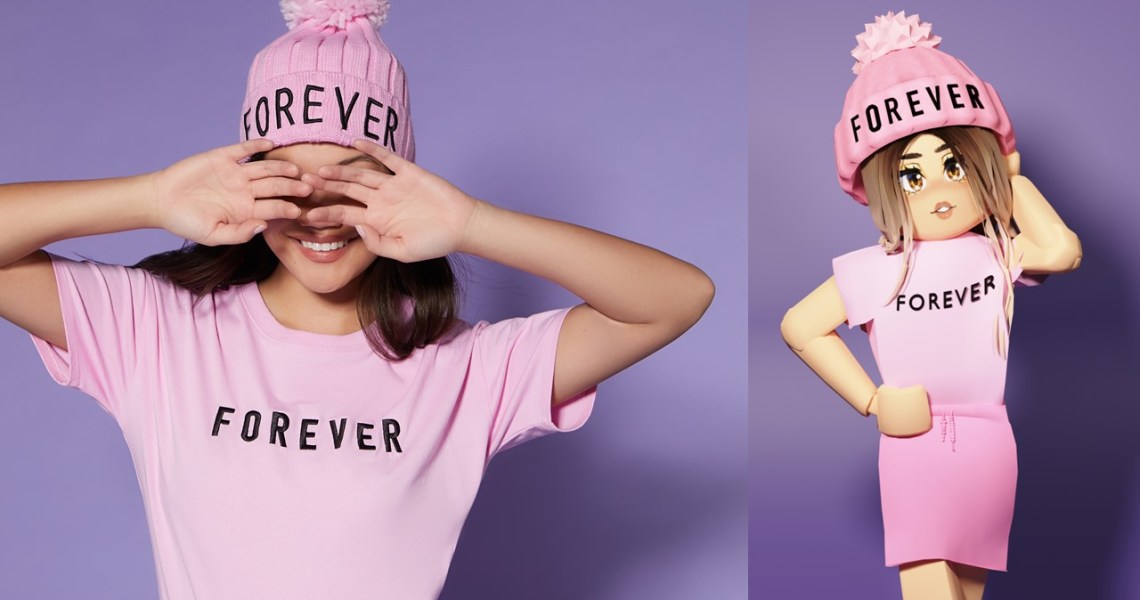One year since its launch onto Roblox, Forever 21 has expanded its Roblox affiliation by launching the F21 Metaverse Collection on its e-commerce site and in stores. The collection, released December 1, is the first to be inspired by its digital fashions that can be purchased on Roblox, pointing to new opportunities for fashion brands playing in metaverse spaces.
The physical collection includes a range of hoodies, T-shirts and the “Forever” Beanie, the latter of which is the top-selling item in Forever 21 Shop City on Roblox. Prices start at $14.99. Forever 21 will be promoting the collection on its own social channels, with a focus on Instagram, but not through Shop City.
Forever 21 launched its digital fashion offering on Roblox in late 2021. The black beanie has sold 1.5 million units in the game and up to 2,000 per day.
“As more people participate in the virtual world, it’s become even more important for us to continue to meet our customers where they are and provide them with accessible on-trend fashion,” said Jacob Hawkins, chief marketing, digital and omnichannel officer at Forever 21. “Beyond social games, we’ve been able to use Roblox as a testing ground to better understand what our customer wants in products.” The Forever 21 Shop City world in Roblox has had 250,000 visits since last year. That’s a relatively low number compared to other brand worlds, like Nikeland with 28 million visits and Tommy Hilfiger’s Tommy Play with 26.5 million visits.
Forever 21 partnered with virtual world company Virtual Brand Group last year to build its Roblox shopping experience. VBG has also worked with Ralph Lauren, Tommy Hilfiger and PacSun to create metaverse experiences.
Overall, the metaverse play is part of Forever 21’s rebrand to appeal to younger customers, which has included a new CEO appointment in January and new strategies brand-wide. Since filing for bankruptcy and closing stores in 2019, Forever 21 has been owned by SPARC, a joint venture between Authentic Brands Group and Simon Property Group. With VBG, Forever 21 hopes to grow its metaverse-driven business to $20 million in the next 12-24 months.
With the rollout of the physical collection, Forever 21 is playing into fashion’s heightened holiday focus on virtual worlds. Throughout December, its Roblox shopping experience will offer a limited-edition virtual accessories collection, with one item launching per day and available for just 24 hours. According to Roblox’s 2022 Metaverse Fashion Trend report, 70% of Gen-Z users say they borrow ideas for their physical selves from their avatars.
Hawkins said that the brand now has the ability to create a physical collection and adapt that collection for the metaverse, and vice versa. “A year ago we hypothesized combining virtual and physical products in one cycle, and now we’re able to act upon it. We have an infinite loop of innovation to build upon moving forward,” he said.
For digital fashion brands prioritizing sustainability, like DressX and The Dematerialised in the digital fashion space, physical fashion brand R&D is only one part of the appeal of digital fashion. The ultimate goal is to switch out parts of the mass market’s production need as Gen-Z consumers spend time dressing up online, rather than in real life. That could be an appealing factor for fast-fashion brands, which experience much public blowback over their wasteful practices. For its part, Zara launched Metaverse Lime Glam, a collection of digital fashion and beauty items in March 2022. Pacsun, meanwhile, has made its home in Roblox by catering to a younger demographic with mini games and digital items.
“One of the biggest potentials for digital fashion, in terms of mainstream adoption, is absorbing a big portion of the [waste from the] fast fashion market,” said Marjorie Hernandez, co-founder of digital fashion company The Dematerialised. “We want to fulfill users’ desire for something cool and new through digital fashion, so they can [avoid] fast fashion.”




